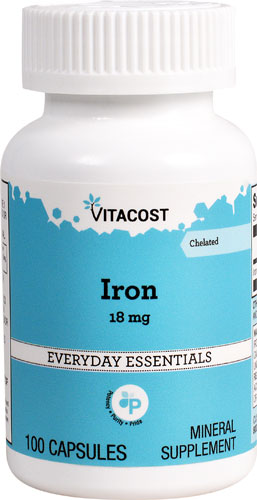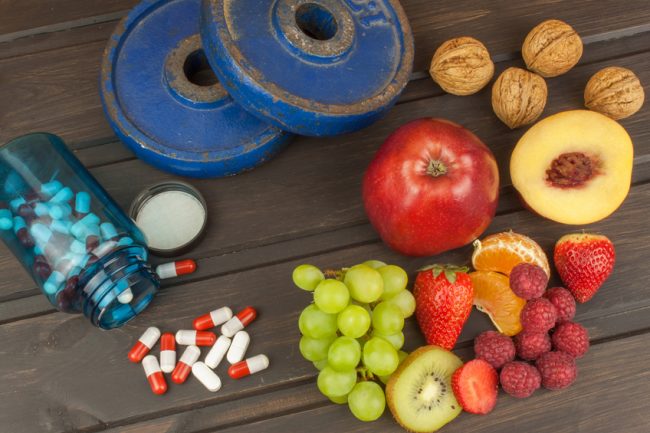If you’re an active woman, you’re probably pretty well-versed in what your body needs. You exercise, eat clean and get your nutrients from healthy, whole-food sources (you go, girl!). But sometimes, this isn’t always enough—that’s when supplements come in.
With a seemingly infinite amount of supplements to sift through, finding which ones are right for you can be daunting. To break it down, following are the pros and cons of five important sport supplements to help you decide which ones fit your needs. If you are not sure about taking supplements, or determining the right dosage for your body and lifestyle, always check with a physician.
1. Iron
Iron is a mineral needed to carry oxygen throughout the body. When training hard, iron levels decrease, which may contribute to fatigue. Your body can also be depleted of iron during your menstrual cycle, so it's important to eat food rich in iron or take a supplement.
Pros
- Easy to find in food sources such as spinach, red meat, fish and beans
- Easy to supplement with a vitamin if you are vegan or don't eat red meat
- Can support workout/athletic performance*
- Supports healthy energy*
- Helps maintain healthy skin, hair and nails*
- Usually comes in small, easy-to-swallow pills
Cons
- May cause upset stomach, constipation and heartburn
- In excess, iron can be dangerous
Suggested: Vitacost Iron
Recommended dosage: 18 mg per day
2. Calcium
Calcium is needed daily to help build and maintain strong bones. When weight training, a diet rich in calcium can also help support healthy bone density.
Pros
- Found in sardines, canned salmon and dairy foods such as low fat milk, Greek yogurt and cheese
- Vegans can find calcium in leafy vegetables such as kale and broccoli
- May help to ease premenstrual syndrome (PMS) symptoms*
- Easy to take as supplement if you don’t consume enough calcium from food sources
- Great option for those who are lactose intolerant
Cons
- May cause constipation or bloating
- Those with a lactose intolerance may be deficient
Suggested: NatureMade Calcium
Recommended dosage: 1,000-2,000 mg per day (broken up into two doses)
3. Vitamin D
Not only is this supplement necessary for calcium to be absorbed by the body, but it also helps to promote muscle strength and growth.*
Pros
- Needs can often be met with 10 minutes of natural sun exposure per day
- Easy to find in fortified orange juice and milk
- Supports bone health*
Cons
- Too much sun can damage the skin
- Very few foods contain vitamin D; egg yolks, salmon, tuna and beef liver are natural sources.
Suggested: Vitacost Vitamin D3
Recommended dosage: Around 2,000 IU twice per day at the same time you take calcium
4. Creatine
Not just for men, creatine naturally occurs in muscle tissue and helps create energy while you're working out. It's an amino-acid-like compound which draws water into muscle cells.*
Pros
- Supports energy production*
- Supports strength and endurance*
- Helps with recovery and muscle growth, which can help burn fat*
Cons
- Cannot be sourced from food
- Can cause water retention, resulting in bloat
Suggested: MET-Rx Advanced Creatine
Recommended dosage: For pre- and post- workout, take 2-5 g. Take on and off. For example, 2-6 weeks on, followed by 2-6 weeks off.
5. Green powders
Green powders are food supplements made from a concentration or a combination of greens like kale or spinach and even edible marine plants like seaweed.
Pros
- Convenient way to add extra vegetable nutrition to your diet
- Easy to blend into smoothies, protein shakes and yogurt
- Beneficial to those on a low-carb diet
- Formulas are plant-based
Cons
- Not a suitable substitute for whole vegetables and fruits
- Does not replace all vitamins
- May not be as filling as whole foods
Suggested: Amazing Grass Green SuperFood® Orange Dreamsicle powder
Recommended dosage: One scoop per smoothie
*These statements have not been evaluated by the Food and Drug Administration. These products are not intended to diagnose, treat, cure or prevent any disease.




